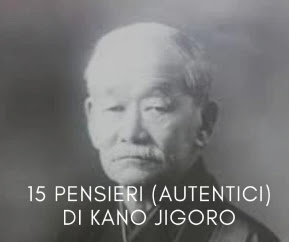Do we really teach judo well?
*This is a full English translation of the previous article "Davvero insegnamo bene il judo?", originally published in Italian.
A few days ago, while researching a completely different topic, I came across the following words:
形と乱取の関係は、之語学に譬ふれば、形は文法に比すべく、乱取は作文に比すべきである。文法に精通するも作文を學ばざれば文章を能くしがたく、作文に熱心なるも文法を知らざれば文章に誤解を生じ易い。故に柔道の修行上形と乱取とは偏發すべからざるものである。
A few days ago, while researching a completely different topic, I came across the following words:
形と乱取の関係は、之語学に譬ふれば、形は文法に比すべく、乱取は作文に比すべきである。文法に精通するも作文を學ばざれば文章を能くしがたく、作文に熱心なるも文法を知らざれば文章に誤解を生じ易い。故に柔道の修行上形と乱取とは偏發すべからざるものである。
"Comparing the relation between kata and randori to the study of a language, kata corresponds to grammar, randori corresponds to composition. Even though one is proficient with grammar, without studying grammar it will be difficult to write a good text. Even if one is passionate about composition but doesn't know grammar, he will easily make mistakes in his text. That's why, when training in jūdō, one mustn't focus solely on kara or randori."
According to the Kōdōkan jūdō official site (go to page), Munakata Itsurō already held a 5th dan when he published the book, laconically entitled Jūdō, from which this passage is taken. I can't help wondering what would Master Munakata say of nowadays jūdō, and I don't mean only about the jūdō of competitions and athletes, where you can even win by scoring points or by your opponent receiving a penalty. I'm talking about everyday's jūdō, and those who dedicate their time to teaching it to common people. I am under the impression that the idea that kata aren't useful, that they are only to be studied for rank and be discarded immediately afterwards, in favour or "real" practice, has become widespread.
I think that Master Munakata's idea of using language as a metaphor fits perfectly with the reality of the modern world, in which language has indeed decaying quite a lot. I'm afraid Master Munakata would find contemporary jūdō quite ungrammatical and I wonder if, notwithstanding all sorts of possible obstacles, randori is really all jūdō can offer of it isn't perhaps the time to bring back traditional practice, combining kata and randori, not only for adults but particularly in the interest of children and teenagers.
Until the next time
Morinaga Aki
Gasshō

.png)
Commenti
Posta un commento
La tua opinione è preziosa per noi. Grazie del tempo che ci hai dedicato.